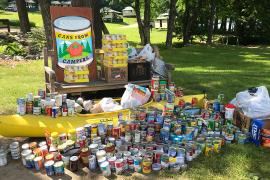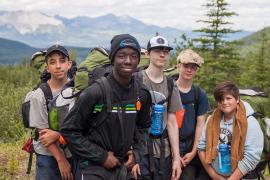Building Camps That Care About Kids — Third in a Series of Four Articles
Maybe Walt Whitman was on to something. When we think of the very best ways to help young people grow into productive, caring adults, we like to think that their experiences at camp matter. In this article, we explore what we learned from the Program Improvement Project (PIP) about the skill-building supports and opportunities for campers.
In the two preceding PIP articles in Camping Magazine, the Community Action Framework for Youth Development (Gambone, Klem, & Connell 2002) was briefly described. This framework describes what is needed to help young people develop into adults who are economically self-sufficient, able to sustain healthy family relationships, and contribute to their community. If we want these adult outcomes, we need to provide our youth with four critical supports and opportunities:
- Multiple supportive relationships with adults and peers
- Physical and emotional safety
- Challenging and engaging activities and learning experiences
- Meaningful opportunities for involvement and membership
The specific steps used in the PIP study were described in Inspirations (the report on the benchmark process that served as the starting point for the project) and Innovations (the description of the quality improvement process used to bring about changes in the supports and opportunities offered at PIP camps). Remember from these previous articles and reports that part of the process for the PIP camps was to take a hard look at their strengths and weaknesses in each developmental area. The PIP camps assessed their organizational practices, talked with campers and staff to better understand why they scored as they did, and then selected particular areas they wanted to improve. Not every PIP camp chose to focus on the same developmental area. Each camp implemented change strategies in areas and ways that made sense to them, then re-assessed with their campers.
Earlier articles in this series noted that camps did very well in providing multiple supportive relationships (see September/
October 2006 Camping Magazine), but faced a few challenges in helping our campers feel emotionally and physically safe (see
November/December 2006 Camping Magazine). The focus of this story is on skill building as a part of the camp experience, so let's look at that particular building block. Here are the key components of skill building and a sample response for each:
- Interesting: "I get to do lots of new things here."
- Experience growth and progress: "I have a chance to learn how to do new things here that I don't get to learn anywhere else."
- Challenging: "The staff here challenge me to do my best."
The responses from the campers were grouped into three categories that represented the extent to which the young people experience the supports and opportunities around skill building. The categories are optimal (should lead to developmental outcomes essential for growth and progress); insufficient (lack the needed supports and opportunities for positive development); or mixed. If a camp showed "significant" change, its score had to improve by at least ten percentage points. For example, if a camp had 25 percent of its campers in optimal levels for overall skill building on the benchmark and had 36 percent at that level after implementing change strategies, the camp would have made "significant" improvement.
What Was Learned About Skill Building
The results of the benchmark study indicated that many of the eighty camps were doing pretty well in the skill-building area. Overall, 41 percent of the campers were classified as having optimal supports and opportunities for building skills that helped them increase their sense of competence and productivity. The individual components to skill building were also encouraging with 41-48 percent of the campers at optimal levels for supports and opportunities that were interesting, offered growth and progress, and were challenging (see the Dimensions of Supports and Opportunities Table below). However, we need to accept this good news with caution, because 25 percent of our campers were still in the insufficient category for overall skill building. For these campers, the camp experience did not challenge and interest them in ways that resulted in new skills or progress in old ones, and they did not leave camp with positive feelings about their competence and productivity.
Some of the twenty-three PIP camps chose to focus on skill building during their improvement process. For these camps, the following comments from some of their campers were important to consider:
- The camp activities are not too different from what the campers do at home.
- Campers feel they do the same activities every year so they aren't interesting.
- Campers want activities that are challenging and let them find their "edge."
As PIP camps' staff strategized about ways to make changes, they often refocused activities to be progressively challenging, especially for campers who were returning to camp for multiple summers. They tried to do more individual goal setting and created new ways to document skill progression. Some camps chose to offer activities unique to a particular age group.
After the camps implemented their strategies, we found that 57 percent of the PIP camps experienced significant improvement in at least one dimension of skill building! Even more importantly, we found that to be most effective, these strategies needed to be holistic and integrated into a camp's structures and policies as well as the activities. To better understand these changes, we talked with two PIP directors, Nancy Halliday and Joanne Fay, whose camps demonstrated positive improvements in skill building.
Halliday is the director at Cherith in the Adirondacks. This camp was strong on skill building initially and continued to show improvement during the PIP process. Halliday shared that skill development that leads to self-confidence and empowerment is integral to the camp philosophy and has been a part of its tradition. Cherith wants girls to leave camp feeling like they have accomplished a goal and learned not only a skill, but also something about themselves. Halliday shared the following insights into the types of strategies the camp used to help provide opportunities for its campers to experience growth in skill building:
- Staff training and experience in activity skills are critical! The camp actively recruits experienced, skilled activity staff. Also, a significant part of precamp staff training is devoted to learning how to teach activities and having fun doing it.
- Staff encourage progression and achievement with a three-tier system in activities. They designed their activity program by looking at each skill area and building progression in ways that made sense for each activity. Every year they "tweak" the program to make sure the progressions are happening in manageable bites so campers can accomplish a skill set in a week.
- Staff feel it is important to recognize each camper's achievements while at camp. They award certificates and if the activity is connected to a national program, they try to get patches and pins for their campers. At the end of the session, campers gather in a closing "Good-bye Circle" where they are acknowledged in the Circle and receive their awards. Girls receiving the highest levels are recognized at an all-camp closing ceremony.
- If campers reach the highest levels of proficiency in an activity, they can sign up to become an "Assistant Activity Leader." This opportunity is based on expertise and is usually reserved for the oldest campers.
- They developed a database to track each child's skill progress so returning campers can start where they left off. This tracking system has helped the campers feel that all is not lost when they leave.
- As a part of their improvement strategy, the staff did more goal setting with the girls and built in reflection opportunities with the campers. The campers did not always recognize their learning, so the processing helped them see their progress and accomplishments. The emphasis was on reflection with the campers, by the campers, and with the help of the cabin staff.
- The staff developed curriculum and structured lesson plans for every activity area.
When asked what advice she would pass along to other camp staff interested in improving their opportunities and supports for skill building, Halliday said, "Emphasize the need to be intentional about what you do within the activity. Devote time to train your staff on good instruction techniques and be sure to emphasize quality teaching. Be sure your philosophy supports your skill emphasis and provide lots of options. Lastly be sure to work with your staff and point out the little successes—it's important for the staff to see how they help the campers grow and find success."
Fay is the director of program development for Crossroads for Kids. This camp also made significant improvement in skill building during the PIP process. The camp leadership decided to make youth development a priority and hired a full-time person to lead this effort. They made a commitment to improve staff training; had opportunities for staff to give feedback (weekly); and let the staff lead in their interest areas as well as have a say in activity offerings. They also feel they have an obligation to provide all kinds of activities, because their campers are from communities that are resource-poor. Fay shared the following strategies they implemented as a part of skill-building focus:
- The staff gave campers opportunities to voice ideas around activities. For example, their campers said they wanted new field trips in day camp that were more interesting and challenging—and the campers saw the actions taken to address their concerns.
- They developed administrative and board support for new activities that focused on skill building. For example they have initiated an adventure-based program that will be challenging and exciting for their campers.
- The staff developed the concept of "Discovery Day." Campers get to plan a full day of activities that interest them such as biking, boating, picnicking at the beach, games, archery, etc.
- They started to emphasize more progression in activities with national programs like swimming. They also developed program manuals that address skill progression in the activities they offer.
When asked what advice she would give about improving in skill building, Fay said, "Get feedback from the kids and put that feedback into action. Help kids recognize that the feedback was acted on. They need to see follow-through, and you need to help them see that you did it. Crossroads has a priority—philosophically with resources (money and staff) and board support—to act on what we learned through this improvement process around skill building. That support is critical to any improvement."
Camp professionals pride themselves on the activities offered at camp. For many camps, activity programs are at the heart of the camp experience and are often critical to recruitment strategies. As pointed out by Walt Whitman, we have to maximize our opportunities to "make the best persons" by carefully looking at our programs for relevance to our mission and goals, the way activities are structured, and what we do to meet individual campers' skill abilities.
M. Deborah Bialeschki, Ph.D., senior researcher, American Camp Association.
Nancy Halliday, Ph.D., associate professor and chair, Physical Education and Sport Sciences Department Hofstra University, director of Camp Cherith in the Adirondacks, Inc.
Joanne Fay, director of program development, Crossroads For Kids.
Originally published in the 2007 January/February issue of Camping Magazine.



